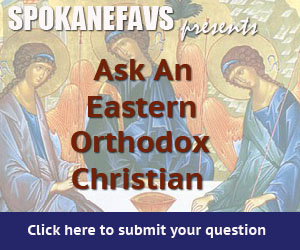What would you like to know about the Eastern Orthodox Christian faith? Submit your question.
How does Eastern Orthodox-influence the United States? What are some examples of people, events, or laws that have been in the United States by Eastern Orthodoxy influence?
The Church (EOC) and State

It recognizes and espouses a clear demarcation between Church and State while calling for a cooperative relationship between the two in a synergistic experience. This historical example for synergy in Church and State relationships is the model of the Byzantine Empire, which lasted over 1,000 years (324 -1453).
The Church functioning in the governmental and political life does not mean the submission of either entity, but more so the acceptance by the State of the God-like principles of equity, justice, care, and genuine service. Although the State is not “under the Church” as one may find in other environments, ideally it should in practice be “under God.”
The Church has always fostered values that encourage good citizenship, obedience to just laws and unjust laws for the greater good (military service, and the defense of the nation) regardless of the form of government.
For the most part, the Church is content to let the various political processes function in a way that separates the Church from partisan politics by maintaining a stance of general non-partisanship, neither formally opposing nor endorsing political candidates. Additionally, the Church recognizes that in accordance with New Testament teaching, regardless of the political structure the government, the Church is prepared to pray for the leader.
The Stand of the Church (EOC) on Human Rights
The Eastern Orthodox Church in its universal perspective and outreach teaches that based on their dignity as human beings created in the image and likeness of God, people have fundamental rights, which transcends national, racial and cultural boundaries. In the 25th Clergy-Laity Congress of the EOC held at Atlanta in 1980, decried governmental actions that deny basic human dignity and rights:
“We disapprove of governmental policies and actions that violate the unalienable rights of all men to freedom and human dignity. We are disillusioned and dismayed at the selective and hypocritical manner in which armed aggression and the violation of human rights by some nations are condemned while similar acts by others are either ignored or even worse, shamelessly justified. We express our indignation at the gross insensitivity of the so-called great or superpowers of the world toward small and defenseless nations and racial minorities of the world, and the cynical manner in which they are used or abused by these powers to further what they believe to be their interests or the interests of their allies. The blacks in South Africa, the Thais and the Tibetans, the Georgians, Ukrainians, Latvians, Estonians and Lithuanians in the Soviet Union, the Afghans and the Kurds in both Iran and Turkey; the Greek Cypriots in Cyprus, the Greeks in Northern Epirus, the Armenian and Greek minorities in Turkey – all these and many others are not included among the concerns of these powers unless they can serve as useful and valuable pawns in their political chess game.”
Many forms of overt and hidden racial discrimination were brought to the forefront and exposed in American society during The Civil Rights Movement of the 1960’s. Then Archbishop Iacovos of North and South America was one of the first powerful people in America to stand with those who were protesting the violation of human rights in the United States in the march with Dr. Martin Luther King at Selma, Alabama in 1965.






